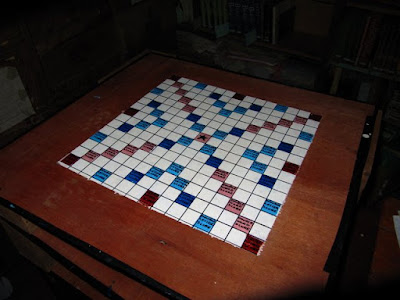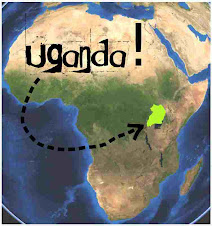As schools let out for summer break back in America, the second trimester of the 2011 school year is in full swing here in Uganda. I find myself very busy these days, and not just with teaching (though they have me teaching an extra physics class this year). Since the beginning of the year, I've been working hard on a project that will increase the school's effectiveness at providing a quality education, without costing much money: making Scrabble boards from local materials for students to play. I wrote a rather long post about my idea for this project last year, but it took some time to become situated at school before I could get it off the ground. Now, though, the project is well on its way.
Scrabble is my favorite board game because it combines my love of words and numbers with strategy, competition, and entertainment. In addition to being challenging and fun, it's also a hell of good way to pick up vocabulary words and improve spelling. Hoping to pass these educational benefits on to my students, I figured out a way to make Scrabble boards locally, on the cheap. The commercial version—an imported product whose price is subject to exchange rate fluctuations—currently retails for around $25 to $30 in Uganda. My local version, on the other hand, costs about $3.50 to produce. This is completely affordable for a government school that, due to a nationwide bureaucratic snafu, had until very recently received exactly 0% of its allotted funding for the 2011 school year (Uganda is plagued by corruption and incompetence at every level; I am no longer surprised by things like this.) A complete game consists of a board made from a piece of plywood painted with enamel paint squares, a simple, tailored cloth tile bag with a drawstring, a tile rack made from glued-together wood scraps, and a set of 1 inch square wooden tiles, labelled with permanent marker. The tiles themselves are the only game component made from outside materials; my grandmother in North Carolina shipped me several hundred blank ones that her woodcarver friend had left over from a previous project, making my job significantly easier. Thanks, Grandma!
 |
| Paul, a student in the Senior 5 class, paints a Scrabble board using a hand-cut stencil. |
From the beginning, I've tried to involve my students in the process of creating the games. There's a whole lot they can get out it. For one, they're learning a practical, marketable skill: how to paint a board or sign. Nearly all signs in Uganda are hand painted because computerized printing services are expensive and labor is cheap. Sign lettering and graphics are produced by cutting out a stencil from manila paper or plastic film (usually discarded X-ray prints or something similar) and sponge-painting the cut-outs using torn-up pieces of foam mattress. This is the exact process we use for the Scrabble boards, and look! They turn out great:
The kids are also learning how to use the geometric construction skills I teach them in math class to draw perfect grids and perpendicular bisectors with a ruler and compass. Maybe some of them will be inspired to become architects, engineers, or go into construction; who knows? At the very least, they're coming to understand that they have the capacity to design, and to create, and that it doesn't take a whole lot of resources or a degree in fine art to do either of those things.
Above all else, by using students to create the game boards, I'm trying to ensure community ownership of the project. This is critical for sustainability. Billions of dollars in foreign aid are squandered in the devloping world every year, simply because the money goes to fund projects that were not initiated, embraced, or carried out by the communities they serve. Rather, many projects are imposed on the communities by the industrialized donor nations. Libraries and schools are built, clothing is given away, and vegetable seeds are distributed to farmers, all paid for by donor dollars. But as soon as the charitable gift giving is over, the donors fly home and everything turns to shit. Brand new libraries go unused because a reading culture was never promoted, shoes donated to schoolchildren are sold by their parents (leaving the children barefoot, as before), and exotic seeds are thrown away, because nobody learned how to grow that particular kind of crop, which had no place in the traditional cuisine, anyway. At the end of the day, the donors have wasted vast amounts of time and money, while the recipients, who really are no better off than they were before, are left greedy for more free handouts.
There's a right way and a wrong way to do development, and I've seen far too much of the latter in this aid-choked country. Take my friend Jake's school, Pope Paul Anaka S.S. in northern Uganda, for example. The school's headmaster is a wizard at obtaining foreign grant money. The school compound boasts several sparklingly clean, modern classroom blocks, a brand new library, and a robust computer lab, financed entirely by NGOs like Invisible Children. Yet the school is ranked among the worst in the country, worse than mine, even, which has substantially fewer resources and infrastructure. The donors, cleary, were misguided in their approach to solving the school's problems. In trying to bring it up to the standards of the western world, they focused on superficial flaws (i.e. aging, low-quality buildings) and not the underlying reasons for its failures as an academic institution (namely, a corrupt administration and undertrained teachers). A "solution" was imposed from outside without an understanding of the rot on the inside. The community's silent cry was for better teachers, better teaching methods, and therefore better educated students, not a swanky school compound.
But back to Scrabble. I am proud of this project because it is simple, fun, effective, and most importantly, because of its community ownership. Although I originally came up with the idea, the school has footed the bill for the game materials, not aid organizations, students have created the boards, and will continue to play the game and teach others how to play, hopefully long after I leave this country. That's what sustainability is. Already, there's a core group of students who—without my urging—come to the school office nearly every day to borrow the boards so that they can play after class. Other students watch them play, learn the rules, and then eventually play the game themselves. Soon, we'll have enough players to hold a school-wide Scrabble tournament, something that the students are very excited about.
So much of what I and most other Peace Corps Volunteers do on a day-to-day basis does make a positive impact on the people we work with, but it may take decades for the results to become visible. This is especially true in teaching; the handful of current African heads of state that were educated by Peace Corps Volunteer teachers (Uganda's President Yoweri Museveni included) is testament to the work we do. Still, it's incredibly rewarding to see the fruit of my labor, for once. Other teachers at my school have seen what I've been doing and have offered their own words of praise and encouragement. Perhaps the most inspiring came from Roggers, a math teacher, who came up to me, pointed to a Scrabble board, and said, "This is what we're lacking in Africa. This is practical, and students are probably learning more from it than anything we teach them in class." I beamed when I heard this. At that moment, I knew that even if nothing else went right for the rest of my service, even if my students continued to perform abysmally on their exams, even if every single project I did in the future failed miserably, that I could look back on Scrabble as something that irrefutably made a positive difference in my community, justifying my being here. Mission accomplished.
 |
| Leaving a legacy. |












have you considered doing a Bananagrams version? it is slightly less math but still good wordplay, and would be easier to make (no need for a board)
ReplyDeletehttp://en.wikipedia.org/wiki/Bananagrams
Great blog..you really have done a great job, i do enjoyed reading it..i do love playing scrabble, i grew up with scrabble around cause my mom do loves the game also..
ReplyDeletehttp://ugandascrabble.com
ReplyDeleteFor scrabble information in Uganda